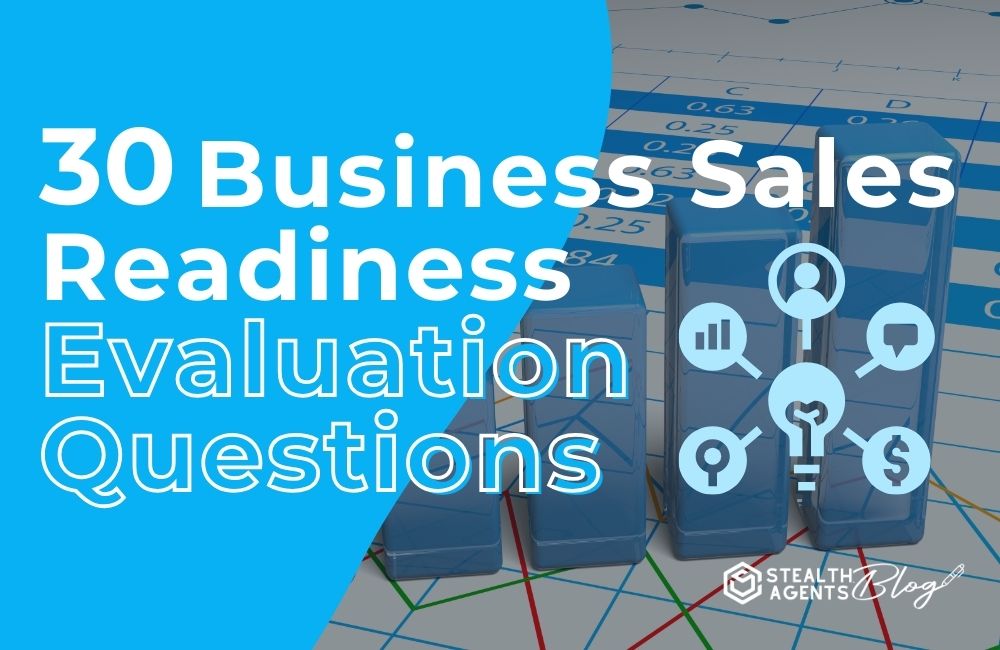Thinking about selling your business can be a bit like getting ready for a big exam. You’re anxious, but you’ve studied hard. You think you’ve got all the answers, yet you can’t shake the feeling that a little extra preparation could make all the difference. But unlike most tests, selling your business isn’t just about knowing the right answers; it’s about knowing the right questions. So, get your ‘exam’ paper ready because here are 30 vital questions to evaluate if you’re truly ready to take the plunge in selling your business.
Introduction
The decision to sell a business is one of the most significant moves an entrepreneur can make. It’s the financial equivalent of a triple somersault, with potential twists and turns that can affect your bank balance and your peace of mind for years to come. The transition can be both challenging and rewarding, and ensuring that you and your business are fully prepared for the process is absolutely crucial.
The Importance of Business Sale Readiness
Why is readiness the key to a successful business sale? Well, it’s like anything in life – preparation prevents poor performance. The more prepared you are, the smoother the transition will be, and you’ll be better equipped to navigate the often-complex landscape of business sales.
Here are 30 questions that will help you assess if your business is geared up and ready to go for a sale:
Financial Readiness
- Do you have all your financials in order? That means your balance sheets, cash flow statements, profit and loss statements, and tax returns all squared away for potential buyers to scrutinize.
- Have you identified any outstanding debts or liabilities? You’re going to need to address these head-on.
- How have your sales been this year compared to last year? A declining trend could raise red flags for buyers.
- What’s your net profit, and how has it grown or declined year over year? Buyers are interested in businesses with upwardly trending profits.
- Are your assets valued correctly? You don’t want to understate or overstate their value.
Operational Readiness
- Is your business scalable? Can a buyer easily replicate your success or will they need to reinvent the wheel?
- What is your customer retention rate like? Businesses with a solid, loyal customer base are more attractive to buyers.
- Can the business run effectively without your involvement? A business too dependent on the owner can be risky for buyers.
- What percentage of business comes from your top 5 clients? Over-reliance on a small number of clients can scare buyers away.
- Are your systems and processes documented? Clear processes can be the difference between a headache and a smooth handover.
Legal and Ethical Readiness
- Are all your business licenses and registrations up to date? Any lapses could delay the sale or diminish the value of your business.
- Is your intellectual property protected? Patents, trademarks, and copyrights should be secure and up to date.
- Are your employee contracts and benefits outlined clearly? Transparency here is key to avoiding any post-sale disputes.
- Have you resolved any outstanding legal issues? Unsettled lawsuits or disputes can be a deal-breaker for potential buyers.
- What’s the environmental impact of your business operations, and are you in compliance? This can be a significant consideration, especially for certain industries and buyers.
Market Readiness
- Are there any significant market changes or trends that could impact the sale of your business? Stay up-to-date and be prepared to address these with potential buyers.
- Who are your main competitors, and what do you do differently? Understanding your competitive edge is critical in a sales pitch.
- What niche or target market does your business serve? Understanding your market helps you position your business for a sale.
- What is the overall outlook for the industry that your business is in? This could have implications for your ask price and the type of buyers you attract.
- Do you have a plan in place for addressing market challenges with potential buyers? Having strategies in place is a sign of a well-prepared seller.
Preparation for Due Diligence
- What might a potential buyer’s due diligence uncover? It’s better to find and address any skeletons in your business’s closet before the buyer does.
- Do you have a team in place to handle the due diligence process? Having skilled professionals at your side is invaluable.
- How much time are you prepared to invest in the due diligence process? Be ready for long hours and mentally prepare for the drill.
- Are you prepared to negotiate the terms of the sale? Knowing your bottom line and being willing to walk away is a powerful negotiating position.
- Do you have an exit strategy in place? It’s not just about the sale; it’s about what comes after for you and the business.
Psychological Readiness
- Are you emotionally ready to part with your business? Selling can be as much a journey of the heart as it is of the head. Ensure you’re ready for the emotional impact.
- What are your personal motivations for selling the business? Understanding why you’re selling will help you stay focused during the process.
- Do you have a plan for transitioning out of the business after the sale? A clear plan helps with emotional readiness and the transition itself.
- How will you handle disclosure to employees? Preparation here is key to maintaining the morale and focus of your workforce during the sale process.
- Do you have a support system in place? Selling a business is a major life event. Having supportive friends, family, or even a business mentor can make all the difference.
Conclusion
Deciding to sell your business is likely one of the most important decisions you’ll ever make as an entrepreneur. It’s a complex process that can be both financially and emotionally rewarding, but mastering the details is key to coming out on top. Preparing with these 30 questions will not only help you evaluate your readiness but also guide you to hone in on crucial areas that may need extra attention before the sale. Happy selling!









